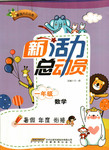题目内容
Learning Peking Opera in schools is intended ____________ the traditional cultural treasure.
A. to preserving B. to preserve C. to have preserved D. preserving
B

 新活力总动员暑系列答案
新活力总动员暑系列答案 龙人图书快乐假期暑假作业郑州大学出版社系列答案
龙人图书快乐假期暑假作业郑州大学出版社系列答案Notice
Dear Degree-doing International Students,
According to the University’s regulations governing the Curriculums (课程) of General Education, the curriculum-choosing procedures (程序) are as follows:
Who
All degree-doing international students are required to choose the curriculums related to Chinese Language and Culture. Refer to Item 3 for different arrangements for undergraduate students (本科生) ,master and doctor students.
What curriculum to choose
You are required to choose two curriculums related to Chinese Language and Culture that suit your own level and program. The curriculum consists of Elementary Chinese, Intermediate (中级的)Chinese, and Chinese Culture (Taught in Chinese and English ). Please refer to Attachment 1 for details.
How many credits
You are required to complete 6 credits for each curriculum within a term.
When and How
A. Undergraduate students: you are required to complete the curriculum selection process (The system will be reopened next week) by 5:00 p.m. on June 22, 2013. About how to choose the courses, you can refer to Attachment 2 (It is in Chinese; turn to your Chinese friends or teachers for help if you cannot follow the procedures of the attachment) for the instructions.
B. Master and Doctor Students: you won’t have to complete the curriculum selection until early September; please wait for further notice on the arrangement.
Your cooperation will be highly appreciated.
Attachment 1: Chinese Language & Culture for International Students
Attachment 2: Handbook for Curriculum Selection
School of International Education
Chongqing University
June 13, 2013
【小题1】This notice is mainly about _______.
| A.course selection | B.how to study elective courses |
| C.regulations of learning Chinese | D.Learning arrangements for elective courses |
| A.Chinese Culture | B.Advanced Chinese |
| C.Elementary Chinese | D.Intermediate Chinese |
| A.Doctor students | B.Master students |
| C.Undergraduate students | D.International students |
| A.your friends | B.your teachers | C.Attachment One | D.Attachment Two |
Kids will often ignore your requests for them to shut off the TV, start their chores (杂事), or do their homework as a way to avoid following your directions. Before you know it, you’ve started to sound like a broken record as you repeatedly ask them to do their assignments, clean their room, or take out the trash. Rather than saying, “Do your chores now,” you’ll be more effective if you set a target time for when the chores have to be completed. So instead of arguing about starting chores, just say, “If chores aren’t done by 4 p. m., here are the consequences.” Then it’s up to your child to complete the chores. Put the ball back in their court. Don’t argue or fight with them, just say, “That’s the way it’s going to be.” It shouldn’t be punitive (惩罚性的) as much as it should be persuasive. “If your chores aren’t done by 4 p. m., then no video game time until chores are done. And if finishing those chores runs into homework time, that’s going to be your loss.” On the other hand, when dealing with homework, keep it very simple. Have a time when homework starts, and at that time, all electronics go off and do not go back on until you see that their homework is done. If your child says they have no homework, then they should use that time to study or read. Either way, there should be a time set aside when the electronics are off.
When a kid wears his iPod or headphones when you’re trying to talk to him, make no bones about it;he is not ignoring you, he is disrespecting you. At that point, everything else should stop until he takes the earplugs out of his ears. Don’t try to communicate with him when he’s wearing headphones—even if he tells you he can hear you. Wearing them while you’re talking to him is a sign of disrespect. Parents should be very tough about this kind of thing. Remember, mutual respect becomes more important as children mature.
【小题1】According to the passage, it seldom happens that________.
| A.kids turn a deaf ear to their parents’ requests |
| B.parents’ directions sound like a broken record |
| C.children are ready to follow their parents’ directions |
| D.parents are unaware of what they are repeating to their kids |
| A.avoid direct ways of punishment |
| B.make him do things at their request |
| C.argue and fight with their child |
| D.allow their child to behave in his own way |
| A.should provide him with a good learning environment |
| B.can do whatever they like |
| C.can stay aside watching TV |
| D.must switch off the power |
| A.parents should take off their headphones when trying to have a talk with their child |
| B.it will make no difference that a kid is wearing his earplugs while talking to his parents |
| C.parents shouldn’t give in to their kid when he shows no sign of respect |
| D.kids’ purposely talking to their parents with iPod gives them a sense of power and control |
| A.that respecting each other is more important than anything else |
| B.how kids behave to ignore and disrespect their parents |
| C.that children should make choices and decisions on their own |
| D.how parents can deal with their kid’s behavior effectively |
SPECIAL EVENTS(事件)
THIS WEEKEND
Captain Goodfellow
Do your children enjoy interesting stories, funny games, and exciting dances? Captain Goodfellow will be ready to teach all these things to children of all ages at the City Theatre on Saturday morning at 10:00, free.
Walking Tour of the Town
Forget your worries on Saturday morning. Take a beautiful walk and learn about local history. Meet at the front entrance of City Hall at 9:30. Wear comfortable shoes!
Films at the Museum
Two European films will be shown on Saturday afternoon at the Museum Theatre. See Broken Window at 1:30. The Workers will be at 3:45. For further information, call 4987898.
International Picnic
Are you tired of eating the same food every day? Come to Central Park on Saturday and enjoy food from all over the world. Delicious and not expensive. Noon to 5:00 p.m.
Take Me out to the Ballgame
It’s October, and tonight is your last chance to see the Redbirds this year. Get your tickets at the gate. It might be cold… Don’t forget sweaters and jackets.
Do you want to hear “The Zoo”?
“The Zoo, a popular group from Australia, will give their first U.S. concert tomorrow night at 8 at Rose Hall, City College.
【小题1】You can probably eat Chinese, Italian, and Arab food ________.
| A.at the front entrance of City Hall | B.at the Ballgame |
| C.at 5:00 p.m. | D.at Central Park on Saturday |
| A.your worries | B.your beautiful walk |
| C.your learning about local history | D.your comfortable shoes |
| A.a British newspaper | B.an American newspaper |
| C.a British magazine | D.an American magazine |